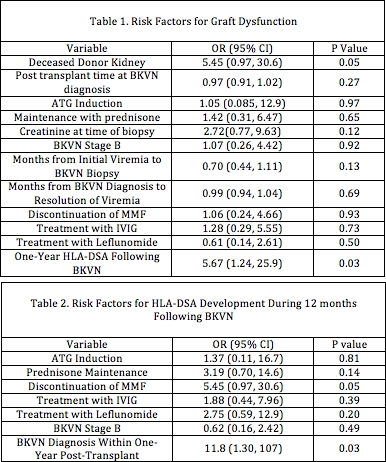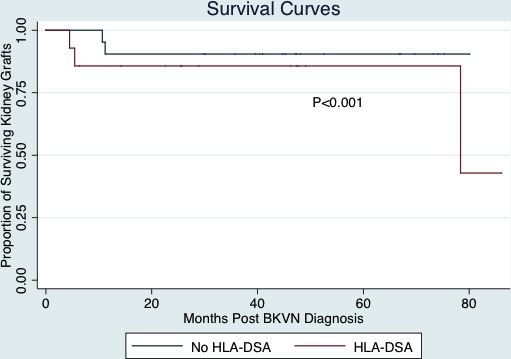Identification of Donor HLA-Specific Antibodies as a Risk Factor for Graft Dysfunction and Failure Following BK Virus Associated Nephropathy.
Transplantation Medicine, Weill Cornell Medicine, New York, NY.
Meeting: 2016 American Transplant Congress
Abstract number: D222
Keywords: HLA antibodies, Kidney transplantation, Polyma virus, Renal dysfunction
Session Information
Session Name: Poster Session D: Polyomavirus
Session Type: Poster Session
Date: Tuesday, June 14, 2016
Session Time: 6:00pm-7:00pm
 Presentation Time: 6:00pm-7:00pm
Presentation Time: 6:00pm-7:00pm
Location: Halls C&D
Background: BK virus associated nephropathy (BKVN) has emerged as a significant cause of graft dysfunction and graft failure. Identification of risk factors for graft dysfunction and graft failure following BKVN diagnosis can lead to targeted effective therapy.
Methods: We performed a retrospective review of kidney allograft recipients diagnosed with BKVN (n=35) from 6/2008 to 6/2013 and evaluated risk factors for graft dysfunction defined as an increase of ≥0.5mg/dL creatinine during the 12 months following BKVN diagnosis. Baseline characteristics, medications, BKVN biopsy grade, duration of viremia preceding BKVN diagnosis and time of viral clearance following BKVN diagnosis were studied. The relationship between development of donor HLA-specific antibodies (DSA) and graft functional decline was also examined.
Results: Among the 12 variables examined, only two, deceased donor graft (P=0.05) and development of DSA (P=0.03) were associated with decline in graft function (Table 1). DSA developed in 40% of patients with BKVN and of these 57% developed graft dysfunction compared to only 19% of patients without DSA. Among the risk factors examined for DSA development, BKVN diagnosis in the first year of transplantation (P=0.03) and discontinuation of MMF (P=0.05) emerged as a significant risk factors (Table 2). Inferior graft survival was observed in those with BKVN and DSA compared to those with BKVN and without DSA (Figure 1).


Conclusion: Development of DSA is a risk factor for graft dysfunction following BKVN diagnosis and is associated with reduced rate of graft survival. Our data advocate DSA monitoring following BKVN diagnosis. Strategies aimed at preventing DSA following BKVN may improve graft function and outcome in those diagnosed with BKVN.
CITATION INFORMATION: Abuhelaiqa E, Salvatore S, Lee J, Lee J, Sharma V, Muthukumar T, Seshan S, Suthanthiran M, Dadhania D. Identification of Donor HLA-Specific Antibodies as a Risk Factor for Graft Dysfunction and Failure Following BK Virus Associated Nephropathy. Am J Transplant. 2016;16 (suppl 3).
To cite this abstract in AMA style:
Abuhelaiqa E, Salvatore S, Lee J, Lee J, Sharma V, Muthukumar T, Seshan S, Suthanthiran M, Dadhania D. Identification of Donor HLA-Specific Antibodies as a Risk Factor for Graft Dysfunction and Failure Following BK Virus Associated Nephropathy. [abstract]. Am J Transplant. 2016; 16 (suppl 3). https://atcmeetingabstracts.com/abstract/identification-of-donor-hla-specific-antibodies-as-a-risk-factor-for-graft-dysfunction-and-failure-following-bk-virus-associated-nephropathy/. Accessed February 26, 2026.« Back to 2016 American Transplant Congress
